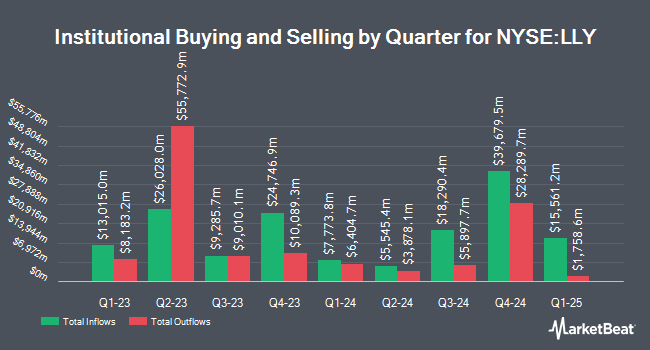Csenge Advisory Group lowered its stake in shares of Eli Lilly and Company (NYSE:LLY - Free Report) by 22.9% during the 4th quarter, according to the company in its most recent disclosure with the Securities and Exchange Commission (SEC). The institutional investor owned 4,604 shares of the company's stock after selling 1,370 shares during the period. Csenge Advisory Group's holdings in Eli Lilly and Company were worth $3,554,000 at the end of the most recent reporting period.
Several other institutional investors have also recently made changes to their positions in LLY. Peterson Financial Group Inc. purchased a new stake in shares of Eli Lilly and Company during the third quarter worth $27,000. MidAtlantic Capital Management Inc. bought a new position in shares of Eli Lilly and Company in the third quarter worth $30,000. Highline Wealth Partners LLC increased its holdings in shares of Eli Lilly and Company by 80.0% in the fourth quarter. Highline Wealth Partners LLC now owns 45 shares of the company's stock worth $35,000 after purchasing an additional 20 shares during the period. Kovitz Investment Group Partners LLC increased its holdings in shares of Eli Lilly and Company by 117.1% in the third quarter. Kovitz Investment Group Partners LLC now owns 46,132 shares of the company's stock worth $41,000 after purchasing an additional 24,879 shares during the period. Finally, Compass Financial Services Inc bought a new position in shares of Eli Lilly and Company in the fourth quarter worth $50,000. Hedge funds and other institutional investors own 82.53% of the company's stock.
Eli Lilly and Company Stock Up 0.8 %
Shares of LLY stock traded up $6.84 during trading hours on Wednesday, hitting $864.04. 2,199,496 shares of the company's stock traded hands, compared to its average volume of 3,749,394. The stock's fifty day simple moving average is $796.41 and its two-hundred day simple moving average is $845.73. Eli Lilly and Company has a 12-month low of $711.40 and a 12-month high of $972.53. The stock has a market cap of $820.25 billion, a price-to-earnings ratio of 73.77, a PEG ratio of 1.35 and a beta of 0.42. The company has a quick ratio of 0.97, a current ratio of 1.27 and a debt-to-equity ratio of 2.03.
Eli Lilly and Company (NYSE:LLY - Get Free Report) last announced its quarterly earnings results on Thursday, February 6th. The company reported $5.32 earnings per share for the quarter, missing the consensus estimate of $5.45 by ($0.13). Eli Lilly and Company had a net margin of 23.51% and a return on equity of 86.26%. On average, analysts expect that Eli Lilly and Company will post 23.48 EPS for the current year.
Eli Lilly and Company announced that its board has approved a share repurchase program on Monday, December 9th that authorizes the company to repurchase $15.00 billion in shares. This repurchase authorization authorizes the company to buy up to 2% of its shares through open market purchases. Shares repurchase programs are generally an indication that the company's management believes its stock is undervalued.
Eli Lilly and Company Increases Dividend
The business also recently announced a quarterly dividend, which will be paid on Monday, March 10th. Shareholders of record on Friday, February 14th will be given a $1.50 dividend. This represents a $6.00 dividend on an annualized basis and a yield of 0.69%. The ex-dividend date of this dividend is Friday, February 14th. This is an increase from Eli Lilly and Company's previous quarterly dividend of $1.30. Eli Lilly and Company's payout ratio is 51.24%.
Analysts Set New Price Targets
Several research analysts have recently weighed in on LLY shares. Bank of America reaffirmed a "buy" rating and issued a $997.00 price target on shares of Eli Lilly and Company in a report on Tuesday, December 10th. Deutsche Bank Aktiengesellschaft decreased their price target on shares of Eli Lilly and Company from $1,025.00 to $1,015.00 and set a "buy" rating on the stock in a report on Monday, November 4th. Barclays reduced their target price on Eli Lilly and Company from $1,025.00 to $975.00 and set an "overweight" rating on the stock in a research note on Thursday, October 31st. Redburn Atlantic raised Eli Lilly and Company to a "hold" rating in a research note on Monday, November 4th. Finally, StockNews.com raised Eli Lilly and Company from a "hold" rating to a "buy" rating in a research note on Friday, February 7th. Four investment analysts have rated the stock with a hold rating and eighteen have given a buy rating to the stock. According to MarketBeat, Eli Lilly and Company currently has an average rating of "Moderate Buy" and an average target price of $997.50.
Check Out Our Latest Analysis on LLY
Eli Lilly and Company Company Profile
(
Free Report)
Eli Lilly and Company discovers, develops, and markets human pharmaceuticals worldwide. The company offers Basaglar, Humalog, Humalog Mix 75/25, Humalog U-100, Humalog U-200, Humalog Mix 50/50, insulin lispro, insulin lispro protamine, insulin lispro mix 75/25, Humulin, Humulin 70/30, Humulin N, Humulin R, and Humulin U-500 for diabetes; Jardiance, Mounjaro, and Trulicity for type 2 diabetes; and Zepbound for obesity.
Featured Articles

Before you consider Eli Lilly and Company, you'll want to hear this.
MarketBeat keeps track of Wall Street's top-rated and best performing research analysts and the stocks they recommend to their clients on a daily basis. MarketBeat has identified the five stocks that top analysts are quietly whispering to their clients to buy now before the broader market catches on... and Eli Lilly and Company wasn't on the list.
While Eli Lilly and Company currently has a "Moderate Buy" rating among analysts, top-rated analysts believe these five stocks are better buys.
View The Five Stocks Here
Almost everyone loves strong dividend-paying stocks, but high yields can signal danger. Discover 20 high-yield dividend stocks paying an unsustainably large percentage of their earnings. Enter your email to get this report and avoid a high-yield dividend trap.
Get This Free Report
Like this article? Share it with a colleague.
Link copied to clipboard.